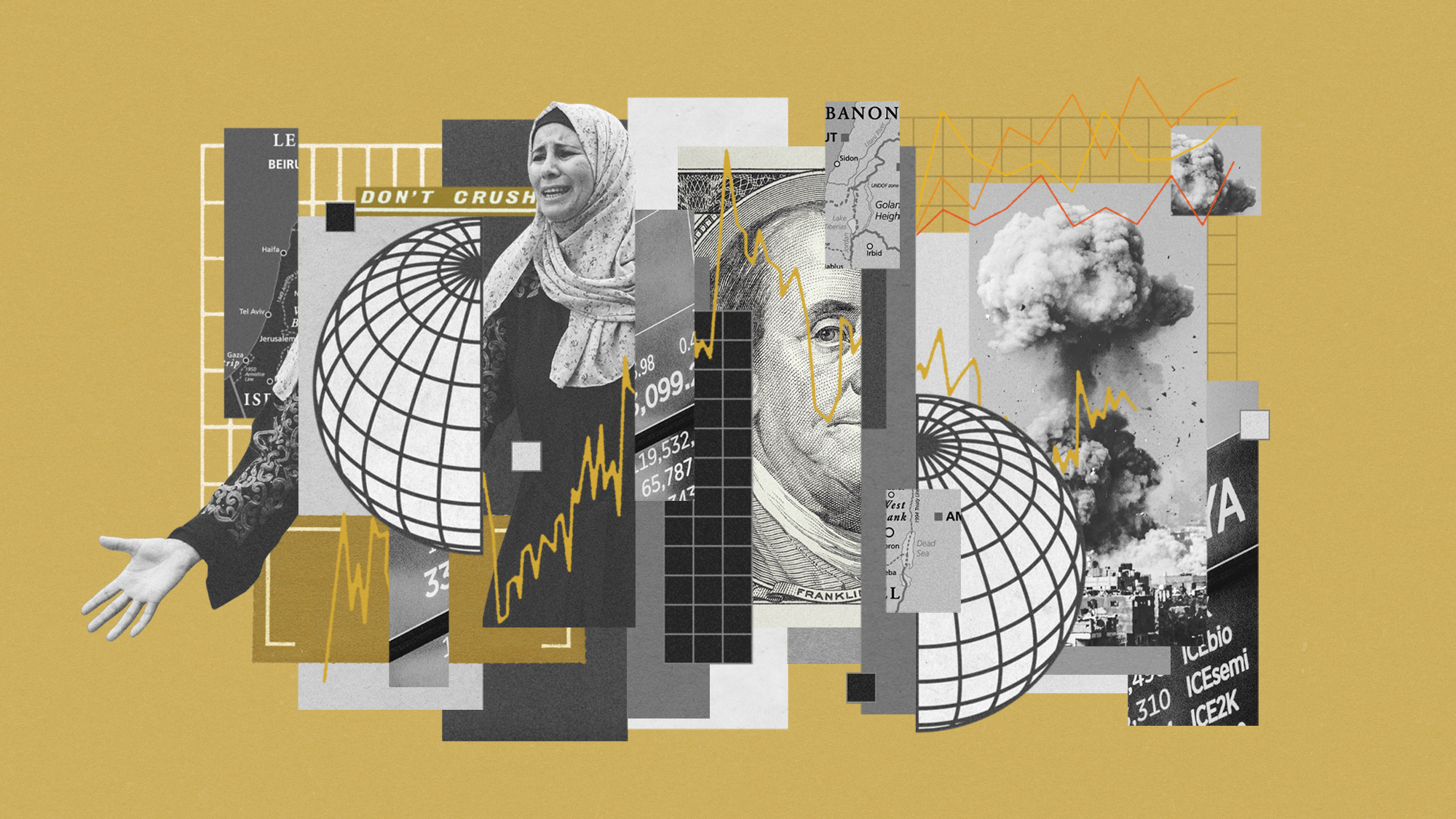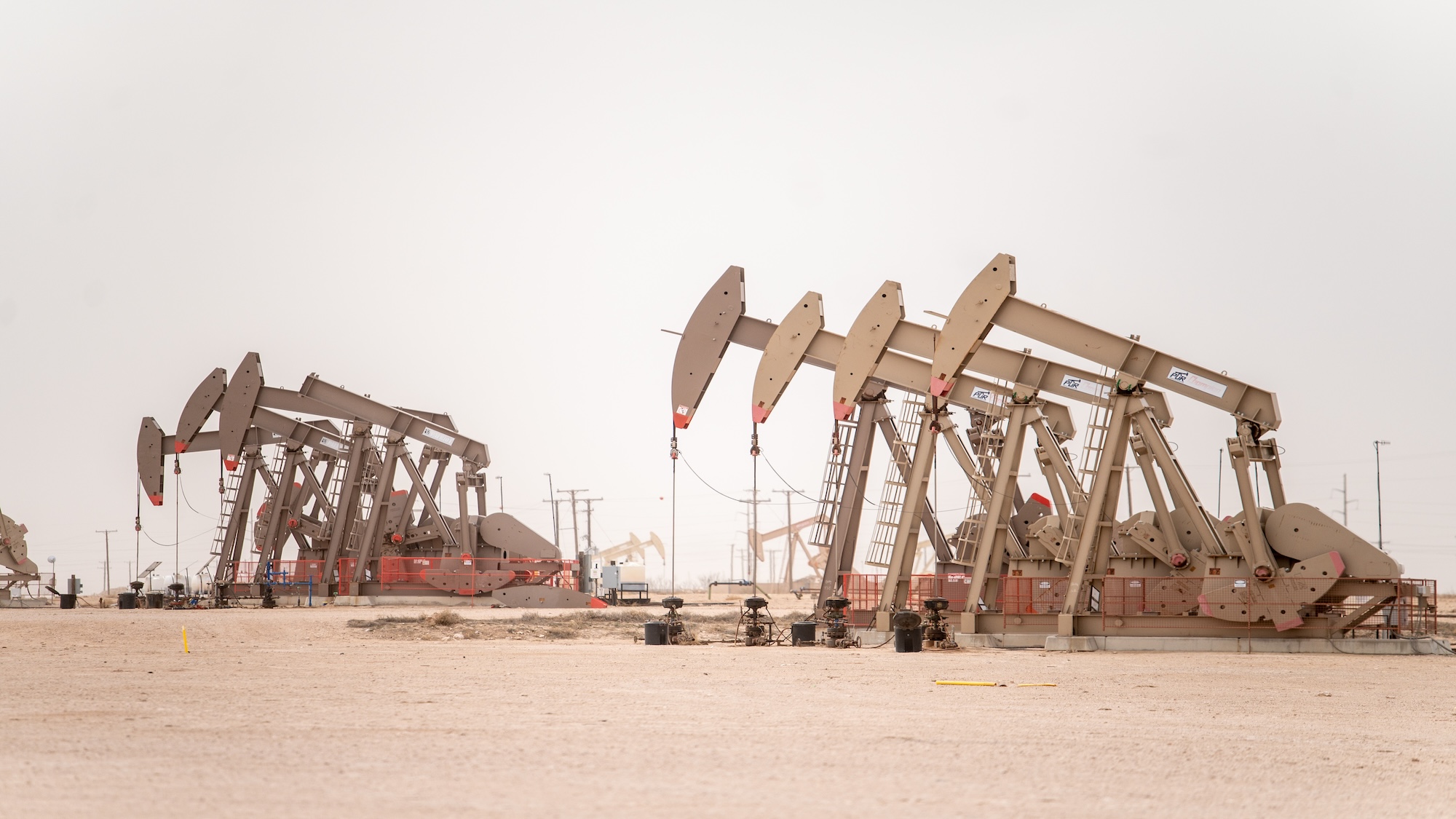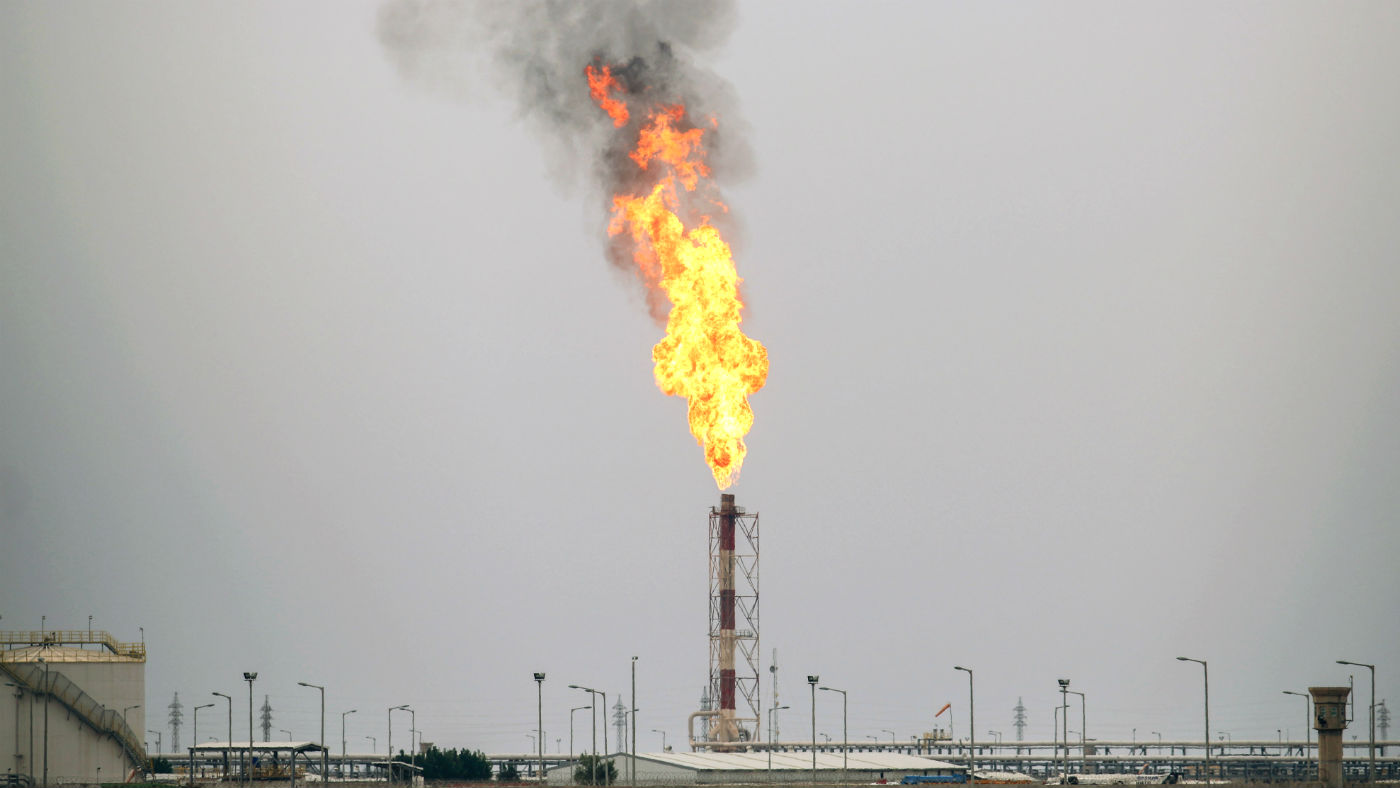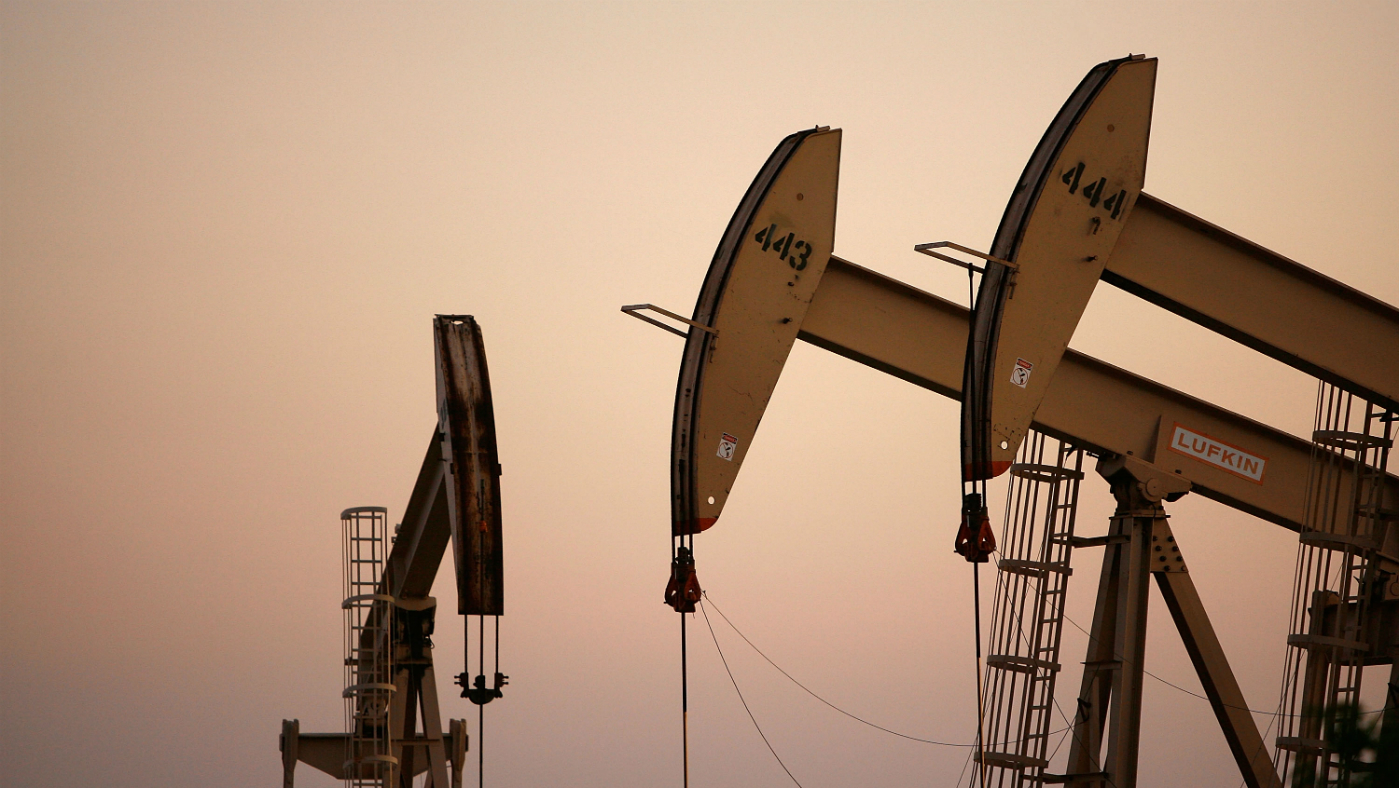Oil price posts two-year highs - but how long can it last?
Brent rose above $59 a barrel this week, its best third-quarter showing since 2004

A free daily email with the biggest news stories of the day – and the best features from TheWeek.com
You are now subscribed
Your newsletter sign-up was successful
Oil price: return to $45 barrel now 'inevitable'
4 August
A "re-test" of the $45-a-barrel low for the benchmark Brent crude oil price is "inevitable" in the near future as supply prices continue to squeeze the market, an analyst arm of Fitch Ratings has said.
The comments from BMI Research, quoted by Reuters, came in the wake of major falls on Monday that saw the price dip below $50 for the first time in six months. A price of $45 would be symbolically significant in the UK as it is the level at which petrol prices below £1 a litre become a distinct possibility.
The Week
Escape your echo chamber. Get the facts behind the news, plus analysis from multiple perspectives.

Sign up for The Week's Free Newsletters
From our morning news briefing to a weekly Good News Newsletter, get the best of The Week delivered directly to your inbox.
From our morning news briefing to a weekly Good News Newsletter, get the best of The Week delivered directly to your inbox.
The Financial Times notes the first trading session in August brought a fall of 5.2 per cent to $49.52 as data showed global production continuing to rise, adding to oversupply concerns, with worries persisting over a manufacturing slowdown in China. Commodities markets have recovered some "poise" in Tuesday trading, the FT says in a separate report, and Brent has moved back marginally above $50.
BMI said prices would remain depressed in the coming months amid pressure from a strong dollar, weakening Chinese economy and the prospect of Iranian oil further flooding the market. "A re-test of Brent crude's 2015 low around $45 per barrel looks inevitable given current ample market supply and intensifying bearish market sentiment toward prices," the firm said in a note to clients.
But analysts say it is unlikely there will be a return to the significantly below $50 norms pre-2005, or the high $100-plus levels the market had become accustomed to in recent years. Instead a "mid-price era" is now looming: BMI itself said it expected prices to move back towards $60 in 2016, in line with consensus forecasts of a return to $60-$70.
In the short-term, however, the trend is down. Sabine Schels, a commodities strategist with Bank of America Merrill Lynch in London, told the Wall Street Journal "we are probably a few dollars away" from a bottom, while David Hufton, of oil brokerage PVM, told the paper "the prospects of a second half-year price rebound have evaporated".
A free daily email with the biggest news stories of the day – and the best features from TheWeek.com
Oil price: Majors braced as $50 barrel looms
3 August
A recent renewed decline in the price of oil is gathering pace, with international benchmark Brent crude hurtling towards the $50-a-barrel threshold it last breached in January at the nadir of its year-long slump.
In London the price per barrel was hovering a little above $51 on Monday morning, after it shed close to 2.3 per cent following a similar fall in New York. It is now more than 25 per cent below the peak of its spring recovery in May and is firmly entrenched in bear market territory, with many predicting a continued slide.
The Wall Street Journal said the latest selloff followed another round of data showing a persistent supply glut, with US producers continuing to increase output and, crucially, a significant decline in manufacturing activity in China. The country is the second-largest consumer of oil in the world and the news is damaging to the outlook for demand, which needs to remain sky high to justify excess production from Opec countries and the US shale industry amid a bitter turf war.
As the FT notes, the falls come on the back of a painful week for oil exploration majors, with the likes of BP, Shell, ExxonMobil and Chevron reporting substantial declines in profit and the withdrawal of billions of dollars' worth of projects.
The industry is bracing for prices to remain low. Michele Della Vigna, co-head of European equity research at Goldman Sachs, has told CNBC that by 2020 it sees oil remaining around $50 per barrel, well below current projections of prices recovering to around $70 and a worrying sign for big oil companies. The World Bank recently said it still expects the price to recover this year and be above $70 by 2020.
[[{"type":"media","view_mode":"content_original","fid":"83606","attributes":{"class":"media-image"}}]]
Of course, for consumers, plummeting oil is good news and it is already beginning to bring down the price of fuel at the pump. According to the RAC, depending on a number of factors, there is a chance the UK could again see a litre of petrol go below the £1 mark if oil prices slip back below $45.
Oil price drop forces huge cut in new projects
31 July
Another major oil company has said it will cut billions of pounds from spending plans as the market adjusts to a second price slump – and more results today are expected to detail further pain across the sector.
BG Group, the subject of a £55bn takeover by Shell that should complete early next year, posted earnings before tax and interest of $1.37bn (£880m) this morning, down by almost half on the $2.65bn (£1.7bn) it reported this time last year, according to the Financial Times.
Reuters notes this marginally beat analyst expectations as output surged by ten per cent, but it reflects the margin struggles the majors are facing amid a prolonged slump in the oil price. At midday Brent crude was down 1.3 per cent to around $52.60 a barrel, which will mark the lowest close for five months if it fails to recover this afternoon.
BG said it would reduce capital spending on new projects to between $6bn and $7bn next year, a cut of 30 per cent on last year.
It follows similar decisions by BP, Shell and Statoil and comes ahead of results from Exxon Mobil and Chevron, which Forbes says are also likely to reveal a major drop in earnings and reduction in spending.
[[{"type":"media","view_mode":"content_original","fid":"83607","attributes":{"class":"media-image"}}]]Elsewhere, Spain's Repsol announced its profits had also been hit by the fall in crude prices, with the Wall Street Journal reporting net profit in the second quarter dropped 44 per cent to €292m (£206m).
Oil price: Shell says downturn could last 'years' as it slashes jobs
30 July
Royal Dutch Shell and British Gas-owner Centrica have said they will cut between them 12,500 oil exploration and production jobs in the face of a pricing downturn that could last "for several years".
Global oil giant Shell, which is working through a £55bn buyout of rival BG Group, said it would cut 6,500 jobs as it scales back on new projects rendered unprofitable by languishing prices, with investment spending set to fall by around $7bn (£4.5bn) this year.
The Financial Times says the job losses include previously announced reductions in countries such as the US, UK, Canada, Norway and Nigeria, while the investment reduction is more than double the $3bn (£1.9bn) forecast in April.
As for Centrica, the BBC reports it is set to axe 6,000 jobs as it moves away from oil and gas exploration and production to focus on its customer-facing British Gas business. As part of this it will be creating a number of new jobs, resulting in a net reduction of 4,000 staff.
The announcements came in half-year results, which revealed Centrica profits fell three per cent to £1bn despite earnings at British Gas almost doubling to £528m. Shell reported a 37 per cent fall in second-quarter earnings to $3.8bn (£2.4bn) on a current costs basis, down from $6.1bn (£3.9bn) in the same quarter last year but ahead of analyst expectations.
The price of oil has fallen back in recent weeks after a recovery through much of the first half of the year, as a supply glut shows no sign of abating.
Benchmark Brent crude rose marginally on Wednesday, trading in New York to $53.80, but is still more than 20 per cent below the peak in May.
Shell said the price may remain low "for several years" but that it saw the "potential" for a return to $70 to $90 a barrel in the medium term.
News of the latest cutbacks follows similar announcements this week by BP and Norwegian Statoil. The FT has previously reported as much as $200bn in investment may be pulled by major companies.
Oil price: could petrol prices dip back below £1 a litre?
28 July
Oil prices continued to slide on Tuesday, with benchmark Brent crude falling a further 1.3 per cent from Monday's five-month low as oversupply concerns persist.
On Tuesday afternoon it was trading at $52.73 a barrel, not far off the $45 bottom of the market in January. With US producers and key exporters continuing to ramp up production and demand on the wane, many suggest the price may yet have further to fall.
The Daily Telegraph asks whether we are in line for petrol prices to fall back below £1 a litre in the UK. Simon Williams, fuel spokesman for the RAC, said for that to happen "we would need to see the price of a barrel of oil get down to $45 or below". As oil is quoted in dollars there would also need to be a weakening of the greenback relative to the pound.
All of which is to say the symbolic threshold is not looming just yet, but Williams noted there are "lots of factors at play here" including a looming re-entry of Iran to global markets. For reference, before the market turned in January a few garages were offering petrol below £1, but the average price bottomed at £1.03.
Oil majors are certainly preparing for oil to remain subdued, with both BP and its Norwegian rival Statoil reporting quarterly results on Tuesday that revealed substantial cuts in capital spending and investment in order to protect investor dividends.
BP said it would cut capital spending by around $3bn to below $20bn for the year ahead, according to Reuters, while Bloomberg says Statoil said it was cutting a further $500m from planned spending to $17.5bn, down from $20bn last year.
BP reported a loss of $6.3bn for the second quarter, the BBC notes, after additional provisions of $7.5bn relating to the Deepwater Horizon oil spill were deducted. The underlying net income of $1.3bn was still two-thirds down on the same period a year ago.
Video: how long will the global oil glut last?
[[{"type":"media","view_mode":"content_original","fid":"83495","attributes":{"class":"media-image"}}]]
-
 How the FCC’s ‘equal time’ rule works
How the FCC’s ‘equal time’ rule worksIn the Spotlight The law is at the heart of the Colbert-CBS conflict
-
 What is the endgame in the DHS shutdown?
What is the endgame in the DHS shutdown?Today’s Big Question Democrats want to rein in ICE’s immigration crackdown
-
 ‘Poor time management isn’t just an inconvenience’
‘Poor time management isn’t just an inconvenience’Instant Opinion Opinion, comment and editorials of the day
-
 How might the Israel-Hamas war affect the global economy?
How might the Israel-Hamas war affect the global economy?Today's Big Question Regional escalation could send oil prices and inflation sky-high, sparking a worldwide recession
-
 Recent mega-mergers could signal a turning point for the US oil industry
Recent mega-mergers could signal a turning point for the US oil industryTalking Point Both Chevron and Exxon have recently spent billions to acquire smaller oil companies
-
 Has Saudi Arabia lost control of oil prices?
Has Saudi Arabia lost control of oil prices?Today's Big Question Kingdom goes it alone to cut production, risking tension with US and reigniting cooling inflation in Europe
-
 US angered by Opec+ oil cut
US angered by Opec+ oil cutSpeed Read Energy prices to rise further as producers slash supply by two million barrels a day
-
 Global oil demand forecast lowered for 2020 and 2021
Global oil demand forecast lowered for 2020 and 2021Speed Read IEA report says jet fuel demand remains the major source of weakness
-
 Are US-Iran tensions flaring again?
Are US-Iran tensions flaring again?In Depth Trump threatens military action over Twitter
-
 Can a deal be struck to raise oil prices?
Can a deal be struck to raise oil prices?In Depth Opec+ will convene today over video link in a bid to boost crude
-
 What do negative oil prices mean?
What do negative oil prices mean?In Depth Perfect storm of oversupply and storage shortages sees producers paying to get rid of US crude